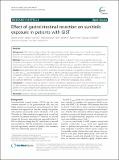| dc.contributor.author | de Wit, Djoeke | en_US |
| dc.contributor.author | van Erp, Nielka P | en_US |
| dc.contributor.author | Khosravan, Reza | en_US |
| dc.contributor.author | Wiltshire, Robin | en_US |
| dc.contributor.author | Allred, Randy | en_US |
| dc.contributor.author | Demetri, George D | en_US |
| dc.contributor.author | Guchelaar, Henk-Jan | en_US |
| dc.contributor.author | Gelderblom, Hans | en_US |
| dc.date.accessioned | 2014-09-08T15:37:02Z | |
| dc.date.issued | 2014 | en_US |
| dc.identifier.citation | de Wit, Djoeke, Nielka P van Erp, Reza Khosravan, Robin Wiltshire, Randy Allred, George D Demetri, Henk-Jan Guchelaar, and Hans Gelderblom. 2014. “Effect of gastrointestinal resection on sunitinib exposure in patients with GIST.” BMC Cancer 14 (1): 575. doi:10.1186/1471-2407-14-575. http://dx.doi.org/10.1186/1471-2407-14-575. | en |
| dc.identifier.issn | 1471-2407 | en |
| dc.identifier.uri | http://nrs.harvard.edu/urn-3:HUL.InstRepos:12785893 | |
| dc.description.abstract | Background: GIST patients often undergo GI-surgery. Previous studies have shown that imatinib and nilotinib exposures were decreased in GIST patients with prior major gastrectomy. We investigated whether major gastrectomy influences the exposure to sunitinib and its active metabolite SU12662. Methods: Pharmacokinetic data from 305 GIST patients included in 4 phase I-III trials were analyzed. Patients were subdivided into 6 groups according to their prior GI-surgery. Apparent clearance (CL/F) and dose-corrected steady-state plasma exposures (AUC24,ss) of sunitinib and SU12662 were estimated using a population PK approach. ANCOVA was performed to test for differences in AUC24,ss and CL/F between each surgery subgroup and controls. Results: Major gastrectomy did not influence sunitinib or SU12662 exposure. The geometric mean of sunitinib and SU12662 AUC24,ss was decreased by 21% and 28% in patients with both gastrectomy and small bowel resection (n = 8) compared to controls (n = 63) for sunitinib (931 ng*hr/mL (95%-CI; 676–1283) versus 1177 ng*hr/mL (95%-CI; 1097–1263); p < 0.05) and SU12662 (354 ng*hr/mL (95%-CI; 174–720) versus 492 ng*hr/mL (95%-CI; 435–555); p < 0.05). No significant differences in exposure were observed in each of the other subgroups versus controls. Conclusion: In contrast to previous results for imatinib and nilotinib, gastrectomy alone does not influence sunitinib or SU12662 exposure. This should be taken into account for the treatment of gastrectomized GIST patients with TKIs. In patients who had undergone both gastrectomy and small bowel resection, sunitinib and SU12662 exposures are significantly, although clinically not relevantly, decreased. | en |
| dc.language.iso | en_US | en |
| dc.publisher | BioMed Central | en |
| dc.relation.isversionof | doi:10.1186/1471-2407-14-575 | en |
| dc.relation.hasversion | http://www.ncbi.nlm.nih.gov/pmc/articles/PMC4133599/pdf/ | en |
| dash.license | LAA | en_US |
| dc.subject | Sunitinib | en |
| dc.subject | Exposure | en |
| dc.subject | Gastrointestinal resection | en |
| dc.subject | GIST | en |
| dc.title | Effect of gastrointestinal resection on sunitinib exposure in patients with GIST | en |
| dc.type | Journal Article | en_US |
| dc.description.version | Version of Record | en |
| dc.relation.journal | BMC Cancer | en |
| dash.depositing.author | Demetri, George D | en_US |
| dc.date.available | 2014-09-08T15:37:02Z | |
| dc.identifier.doi | 10.1186/1471-2407-14-575 | * |
| dash.contributor.affiliated | Demetri, George | |


